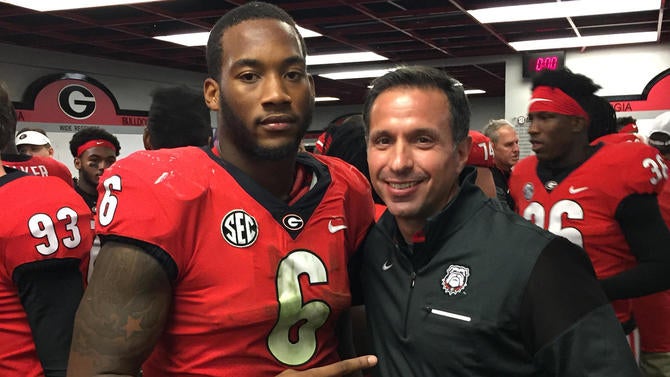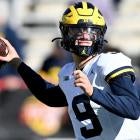Kailey Darns wanted to know why her brother missed the holidays. The hulking absence of a 6-foot-3, 242-pound rock of a man, son and big brother was obvious last year during Christmas, New Year's and beyond.
Maybe that was the low point for Georgia linebacker Natrez Patrick, but it's tough to say for sure because there have been so many of them.
A year ago this month, the Bulldogs were getting ready for the College Football Playoff. At the same time, Patrick was in drug rehab. Specifically, The Bluffs, an in-patient facility in Augusta, Georgia.
Patrick had and has an addiction. That part will never go away. It had taken him to the depths of three marijuana arrests, a scared-straight visit to a maximum security prison, game suspensions and to the brink of a life wasted.
That part will never be forgotten.
"Why weren't you playing in the game?" Kailey kept asking her big brother last year.
Patrick didn't have an answer, at least not one that removed the shame.
"Exactly," he said. "That's the hardest thing to do."
Kailey Darns was honest and heartbroken. She was also 3 years old at the time.
If Patrick gets the start against Texas in the Sugar Bowl, it will be his ninth this season and the 27th of his career. But in many ways, it has been a college career lived in two different realities.
The public could see those marijuana arrests as well as the second and third chances saving him a roster spot. They didn't see the rehab, the relapses and the extraordinary measures taken to preserve -- maybe save -- a life.
A dervish of a man named Damon West had attached himself to Patrick like gum on the bottom of a shoe. The 43-year-old former North Texas quarterback tends to do that to people.
West found a way to channel his life into Patrick. West had all but thrown away his. After a separated shoulder ended his college career in 1996, he gravitated toward pot, beer, some cocaine.
For just about half his life, West was a brilliant screw-up. Even he'd admit to that. A former Wall Street whiz and a one-time up-and-comer on Capitol Hill, West had worked on Dick Gephardt's 2004 presidential campaign. One day, he found himself nodding off at his computer.
"One of the other brokers saw me sleeping," he said. "My co-worker said, 'Damon this isn't one of those jobs you can sleep at. You'll get fired. Let's go down to the parking garage, I've got a little stuff for you.' I thought we were going to go down and snort a little coke. We get down and he hands me this glass pipe with crystal rocks.'"
West stayed up for four days on a crystal meth high.
"I fell in love with the drug," he said. "I gave everything away for that drug."
Patrick knows all this. So do countless other players at Florida, Tennessee, Clemson, Alabama and Arizona to whom West has spoken. His credibility is immediately established. West dropped into a preseason practice at Michigan State last year, lined up in a shotgun and spun a 40-yard completion to the right boundary.
Sure, some of it is theater, some of it is self-promotion. But how many motivational speakers were once staring at 65 years in prison?
If not for a surprise (miracle?) early parole in November 2015 -- seven years into that sentence -- West would still be Texas Department of Justice offender No. 1585689. He wasn't just convicted of robbery -- "organized crime" was how the court put it.
West and a group of meth addicts broke into houses in upscale Dallas homes stealing valuables that could be traded for drugs.
West was (in)famous in Dallas police circles. They called him the "Uptown Burglar". Authorities said his 50-plus robberies took in more than $1 million. His crimes were considered so heinous, the law states West can't reach out to his victims. No apologies.
"It's a felony," he said. "You go back to prison. My victims are the ones who had to pay the biggest price."
As it stands, West is on parole until 2073 when he will be 96.
"Hopefully, Natrez's eyes are open enough now that he's fully aware," West said. "I don't know if he has another chance in life, like me. … I go see a parole officer every month. I check in, I pee in a cup. They make sure I have a job. I bring a pay stub and pay $18 a month for processing."

There are angels in this process you will never know. Texas state Sen. John Whitmire is chair of the Senate Criminal Justice Committee. He knows Patrick's plight and is one of West's biggest advocates.
"He had quite a crime spree," Whitmire said of West. "A lot of people don't get second chances. We should use Damon, put him in public schools to scare people."
Walter Umphrey is a veteran Houston attorney who was impressed by West's legal skills in prison. West paid $5 and two bags of coffee to get an eight-hour tutorial in the prison law library. He learned enough to write his own habeas corpus -- a document requesting an official release from prison. It didn't get him released but it did get him noticed.
"Walter said, 'When you get out of prison, come see me,'" West recalled.
He did. West now works in Umphrey's office. The Beaumont, Texas, resident will graduate from nearby Lamar University in May.
This isn't so much self-promotion, it's more about Natrez Patrick not becoming another Damon West. It's about putting up barriers in the road to keep you from going down the bad path. West didn't have that. Patrick does.
"I had the opportunity to do some good out of all the bad that had gone on," West said. "Finding people that need to hear my message, guys like Natrez. It's something extra, that you're put in their life for a reason."
West's father Bob was a locally famous sportswriter for a half century with the Port Arthur News. Dad was a wordsmith and connected. Damon West was in the Dallas Cowboys locker room when they made their first Super Bowl under Jimmy Johnson.
Remember JJ yelling, "How 'bout them Cowboys?" Damon was in the locker room somewhere.
Describing how his life cratered, West advertised himself as the only "NCAA athlete ever to get a life sentence and get out."
"You put us through a lot," Bob West once told his son. "I wouldn't say we're OK. We will be OK if you can go out and turn one kid's life around."
During his presentations, West says he was molested by a babysitter at age 9. That, he says, might have had something to do with him getting into a life of substance abuse one year later when he first sneaked some of his dad's beer.
It wasn't a fast forward to a maximum-security prison for West. It was more a slow spiral down the drain.
"Damon really screwed his life up with drugs," Bob West said. "I wrote a column about him the Sunday after he was sentenced to 65 years in prison. It was such a traumatic experience for all of us. We didn't know what was going on. We didn't realize how far gone he was."
Enter Natrez Patrick.
During his four years at Georgia, Patrick has been a serviceable, not great, Bulldog. Coaches will attest to that.
"Struggles in space," one said.
So this is not about stretching the boundaries of morality to keep a star on the field.
As it stands, right now, Georgia did more than save a career by keeping him around.
"I feel like it was time to at least do something different," Patrick said. "I feel like it was something I had to come to terms with. Doing the same thing over and over again and expecting different results. That's the definition of insanity."
The other reality was a seemingly undying love of pot. It followed Patrick in and out of jail. His last bust was a year ago, only hours after the Dawgs beat Auburn in the SEC Championship Game.
Police charged a teammate that night with driving under the influence and speeding. Both were charged with misdemeanor possession of marijuana. Police said the players attempted to throw a baggie out of the car.
It was Patrick's third marijuana-related offense and the second in a matter of months. Earlier that 2017 season, he was suspended for four games for a second violation of the Georgia student-athlete drug policy. Three strikes, the policy reads, and you're out.
Patrick was spared a fate that usually nabs even superstars. Two years ago, that policy was modified, according to trainer Ron Courson. Three strikes and you weren't necessarily out. The policy was rewritten to become less punitive, more medicinal based. They take your phone away in rehab. They take away your identity. Georgia doesn't remove you from the team.
"If the only thing we do here at Georgia is teach him about football, we've done a great disservice," Courson said. "If he gets expelled from school, is he going to get his degree? Is that the best thing for him?"
This story really starts a couple of years ago. A friend of West's had a credential to the Bear Bryant Award ceremony in Houston.
"I didn't want to go. I worked all day; I was tired," West said.
That night, the hustler known as Damon West ran into James Franklin, Clay Helton and Dana Holgorsen.
"The most receptive guy in that room was Dabo Swinney," West said.
The coach and former felon talked for maybe a minute. A few months later, Swinney had West speak to Clemson. As the story came pouring out of West, Swinney was in the back of room texting Nick Saban.
"We just had a guy speak to the team tonight by the name of Damon West," Dabo said later. "It's easily one of the most powerful messages I've ever heard."
Word spread. The great Alabama coach sat front row center for West's presentation, rapt. Saban told Smart, his former defensive coordinator.
Upon his visit to Georgia, word spread back to West about Patrick. Courson called with the news Patrick had been arrested in October 2017. The player was suspended. West, the reformed meth addict, had the proverbial light bulb go on above his head.
Why not find the gnarliest, most intense maximum-security prison in Texas and send Patrick there for a day? Scare him straight.
If it takes a village, this was a huge one. Smart kept giving Patrick second chances. Courson is one of the most respected trainers in the country. Whitmire was on board.
"You love the kids. If they make a mistake, you don't kick them out of the family," Courson reiterated. "You hold them close."
That village? They all signed off on a wayward college player spending a day in the joint -- Georgia, Smart, the Texas prison system.
"I've been in the agency for 25 years, first time I've seen it done," said Senior Warden Carol Gene Monroe.
"I actually didn't think Kirby Smart would sign off on it," Bob West said. "That was pretty much untreaded territory for a college football coach."
"They wanted to kind of expose the kid," Whitmire said. "Apparently, it made a difference."
Something special had gone on. You have to understand, the Texas prison system is the largest in the country. It doesn't care one way another for feel-good stories. But for some reason, an infamous Texas prison named the Michael Unit opened its doors to Patrick the weekend of Georgia's game against Missouri last year.
The Michael Unit is a maximum-security prison with 3,300 offenders about an hour's drive from Dallas.
"We have every crime you can think of," Monroe said. "... I have everything except death row."
Into that setting, Patrick descended last year with a Georgia graduate assistant, West and Bob Beaudine, a motivational speaker himself as CEO of Eastman and Beaudine, an executive search firm.
"Half the room went straight to Natrez. Half the room went to me," West said. "You could hear them say, 'Little brother, what are you doing?' Natrez was floored at how they took him in. They were saying, 'Look man, you've got to get your head out of your butt.'"
Remember, we're not talking about a hardcore offender in Patrick. The senior from Atlanta had been a four-star prospect, a top 100 player, a second-team All-American pick by USA Today.
He was still a brother to Kailey.

Patrick had heard enough stories before visiting the Michael Unit to make an impression. West literally had to fight to save his own life while in prison. In his presentations, West tells the story of "Black Jack," a giant gang leader who carried a knife and was out to get him.
West was proactive, waiting for Black Jack one day in a bathroom. Before the predator could get him, West swung a five-pound fan motor at Black Jack.
"It was a very effective weapon. I didn't kill him. I knocked him out. Got the first hit on him, shot him off [his feet] like a cartoon character," West said.
"I heard ribs cracked, crushed his skull and stepped on his head. … I grabbed my fan motor, went back to my cell and cried myself to sleep."
Black Jack never bothered West again. That message, that culture was conveyed to Patrick that day at the Michael Unit.
"Seeing the size of the cells, seeing what those guys go through daily, the lack of freedom they have," Patrick said. "Once you get behind those walls, you kind of feel enclosed. We were free but just being in there you felt like you were locked away.
"It just opened my eyes and made me prioritize some things."
Patrick's coach has allowed this story to be told because it's time. There is shame in it, sure. But there is also redemption.
While in rehab, Patrick found himself grooming horses -- they call it "equestrian therapy" -- sitting around a campfire with other addicts.
"It was either that or I was insane," he said. "I'm pretty sure I'm not insane so it was just something I had to come to terms with."
While marijuana has become more socially and legally acceptable, it's still the bane of coaches everywhere. Pot might be a latter-day six pack, but is still reflects a weakness. It is definitely not performance-enhancing.
"I don't know if it's more socially acceptable; it's a cultural thing," Smart said. "Natrez has been around it for a long time."
"It's sobering when you take a 19-, 20-year-old kid and pull him out of school and say, 'We're going to put you in drug rehab clinic,'" Courson said. "Lockdown, can't contact the outside. Can't talk to your mom or little sister. It's a shock to your system."
Patrick spent at least a month in rehab. Out-patient therapy continued at the Athens Area Commencement Center.
"I think the world of that kid," said Rob Hinzman, administrator at the center. "He's one of those favorites at the athletic department. 18-19-20-year-olds, most of them are self-centered. He's got a little give-back to him."
Because of privacy laws, there isn't much detail from behind those walls. The center provides an initial six-week treatment that can be followed up by two years in a follow-up regimen.
Hinzman said there are no athletes currently being treated at the center.
"It was different; it was hard," Patrick said. "During Christmas and New Year's, I felt like I needed that time to myself to kind of get things in order. To make up my mind on what I wanted to do with my life. That kind of gave me all the clarity I needed."
His coach is your typical, stern SEC coach at the apex of his profession. He is there to primarily win SEC championships or questions will be asked. But Smart was moved by West's coffee bean analogy. There are posters all over the Georgia facility comparing prison to a pot of boiling water. You're either a carrot, an egg or a coffee bean.
In that water, a carrot will soften, an egg will harden, but that coffee bean?
"If you want to survive prison, you want to be like that coffee bean," West was told. "That coffee bean changes the water."
It changes its surroundings. It becomes coffee.
"Coffee bean being the change," Patrick said. "Everybody can relate to that."
There wasn't exactly closure for Patrick. A month and a half after that prison visit, a night after making three tackles against Auburn in that 2017 SEC Championship Game, Patrick just about threw it all away again.
But 11 days after DUI stop and marijuana citation alongside his teammate, the charges were dropped against Patrick.
He has been a model citizen and player as of late.
Patrick has played in all 13 games this season. He became friends with former Bulldogs linebacker Odell Thurman, who had his own substance abuse issues.
"From the first time we talked on the phone, [Patrick's] remorse was genuine, especially to his mother. You can't fake that stuff. That's important," West said.
"I hear a lot from these college coaches. 'Hey Damon, I have guys with marijuana issues.' My whole story started with a can of beer and a joint. It doesn't necessarily stop there."
For the moment, all the madness and sadness has stopped for Natrez Patrick.
He was home this year for Christmas and will be spending New Year's playing in the Sugar Bowl.






















